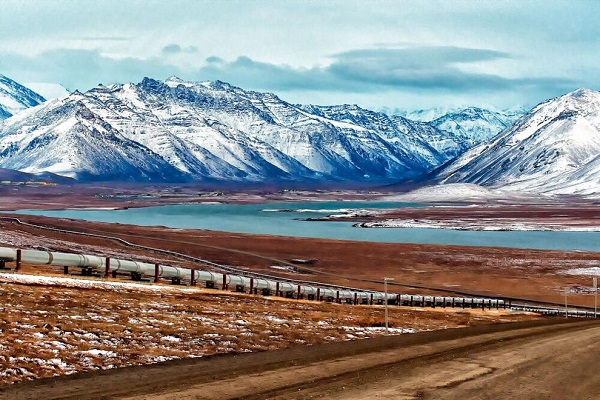Energy
House votes to block China from buying oil from US reserves

By Matthew Daly in Washington
WASHINGTON (AP) — The Republican-controlled House on Thursday voted to block oil from the country’s emergency stockpile from going to China.
The bill, one of the first introduced by the new GOP majority, would prohibit the Energy Department from selling oil from the Strategic Petroleum Reserve to companies owned or influenced by the Chinese Communist Party. It passed easily, 331-97, with 113 Democrats joining unanimous Republicans in support.
Rep. Cathy McMorris, R-Wash., the new head of the House Energy and Commerce Committee, said the bill would help end what she called President Joe Biden’s “abuse of our strategic reserves.”
Biden withdrew 180 million barrels from the strategic reserve last year in a bid to halt rising gasoline prices amid production cuts by OPEC and a ban on Russian oil imports following Moscow’s invasion of Ukraine. The monthslong sales brought the stockpile to its lowest level since the 1980s. The administration said last month it will start to replenish the reserve now that oil prices have gone down.
McMorris Rodgers accused Biden of using the reserve to “cover up his failed policies” that she said are driving up energy prices and inflation.
“Draining our strategic reserves for political purposes and selling it to China is a significant threat to our national and energy security. This must be stopped,” McMorris Rodgers said.
The measure is the first in a series of GOP proposals aimed at “unleashing American energy production,” McMorris Rodgers said as Republicans seek to boost U.S. production of oil, natural gas and other fossil fuels.
“There’s more to come. This is just the beginning,” she said.
Democrats, including former Energy and Commerce Chairman Frank Pallone of New Jersey, said Republicans were trying to fix a problem of their own making. China is among numerous potential adversaries that buy U.S. oil after the GOP-led Congress lifted an export ban in 2015.
“If Republicans were serious about addressing this issue, they would have brought forward a bill that banned all oil exports to China,” Pallone said, adding that sales from the strategic reserve amounted to about 2% of U.S. oil sold to China last year.
“If we truly want to address China using American oil to build its reserves, let’s actually take a serious look at that, rather than skirt around the issue because Republicans are scared of Big Oil’s wrath,” Pallone said.
The current process allows for crude oil sales from the strategic reserve to companies that make the highest offer, which includes U.S. subsidiaries of foreign oil companies, and they could then export that crude oil overseas. Last year, millions of barrels of oil from the U.S. reserves wound up being exported to China, including to a subsidiary of China’s state-run oil company, Sinopec.
The Energy Department said in a statement Thursday that Biden “rightly authorized emergency use” of the strategic reserve, also known as the SPR, to address supply disruptions and “provide relief to American families and refineries when needed the most.”
The Treasury Department estimates that release of oil from the emergency stockpile lowered prices at the pump by up to 40 cents per gallon. Gasoline prices, meanwhile, averaged about $3.27 per gallon on Thursday, down from just over $5 per gallon at their peak in June, according to the AAA auto club.
“By law we are required to select the highest value bid to ensure the best return for taxpayers, and since 2017 the vast majority of oil sold from the reserve is sold to American entities,” the Energy Department said. Over the last five years, less than 3% of oil from the strategic reserve has gone to China, officials said.
The House bill now goes to the Democratic-controlled Senate. Sen. John Barrasso, R-Wyo., has introduced a similar measure.
Energy
Houses passes bill to protect domestic oil production, protect Iñupiat community

From T
Indigenous communities are advocating for economic development projects in the North Slope, explaining that more than 95% of their tax base comes from resource development infrastructure.
The U.S. House passed another a bill to advance domestic energy production, this time in response to cries for help from an indigenous community living in the Alaska North Slope.
The bill’s cosponsor, a Democrat from Alaska, did not vote for her own bill. It passed with the support of five Democrats, including two from Texas who are strong supporters of the U.S. oil and natural gas industry.
The U.S. House has advanced several bills and resolutions to support domestic U.S. oil and natural gas production, supported by Texas Democrats. They’ve done so after the Biden administration has taken more than 200 actions against the industry, The Center Square reported.
One includes the Department of the Interior restricting development on over 50% of the Arctic National Wildlife Refuge (ANWR), directly impacting the Iñupiat North Slope community.
The Alaska North Slope region includes a part of ANWR and National Petroleum Reserve-Alaska (NPRA). Both are home to the indigenous Iñupiat community who maintain that the Biden administration is trying to “silence indigenous voices in the Arctic.”
The plan to halt North Slope production was done through a federal agency rule change, a tactic the administration has used to change federal law bypassing Congress. The rule cancels seven oil and gas leases issued by the Trump administration in the name of “climate change.” Interior Secretary Deb Haaland said canceling the leases was “based on the best available science and in recognition of the Indigenous Knowledge of the original stewards of this area, to safeguard our public lands for future generations.”
The indigenous community strongly disagrees, saying they weren’t consulted before, during or after the rule change.
Nagruk Harcharek, president of the Voice of Arctic Iñupiat, a nonprofit that represents a collective elected Iñupiaq leadership, says the administration’s mandate “to ‘protect’ 13 million acres of our ancestral homelands was made without fulfilling legal consultative obligations to our regional tribal governments, without engaging our communities about the decision’s impact, and with an incomplete economic analysis that undercuts North Slope communities.”
He argues the administration has overlooked “the legitimate concerns of elected Indigenous leaders from Alaska’s North Slope. This is a continuation of the onslaught of being blindsided by the federal government about unilateral decisions affecting our homelands.”
Restricting NPR-A oil production is “yet another blow to our right to self-determination in our ancestral homelands, which we have stewarded for over 10,000 years. Not a single organization or elected leader on the North Slope, which fully encompasses the NPR-A, supports this proposed rule,” he said, adding that they asked for it to be rescinded.
In response, U.S. Reps. Mary Sattler Peltola, D-Alaska, and Pete Stauber, R-Minn., introduced HR 6285, “Alaska’s Right to Produce Act.” The U.S. House Committee on Natural Resources Subcommittee on Energy and Natural Resources held a hearing on the issue; members of the Iñupiat Community of the Arctic Slope and the Kaktovik Iñupiat Corporation testified.
Kaktovik Iñupiat Corporation president Charles Lampe said they “refuse to become conservation refugees on our own homelands and unapologetically stand behind the Alaska’s Right to Produce Act.”
The Kaktovik is the only community located in the ANWR. The North Slope Iñupiat have stewarded their ancestral homelands for thousands of years, predating the creation of the U.S. federal government, the Interior Department and the state of Alaska, they argue.
The indigenous communities are advocating for economic development projects in the North Slope, explaining that more than 95% of their tax base comes from resource development infrastructure. Tax revenue funds public school education, health clinics, water and sewage systems, wildlife management and research and other services that otherwise would not exist, they argue. Eliminating their tax base, will directly impact their lives and jeopardize their long-term economic security, they argue.
The House passed Alaska’s Right to Produce Act on Wednesday to reverse the rule change and establish the Coastal Plain oil and gas leasing program. It authorizes and directs federal agencies to administer oil and natural gas leasing on 13 million acres of public land in the North Slope.
The bill passed by a vote of 214-199 without the support of its Democratic cosponsor from Alaska, Peltola, who voted “present.”
Five Democrats voted for it: Sanford D. Bishop, Jr. of Georgia, Henry Cuellar and Vincente Gonzalez of Texas, Jared Golden of Maine and Marie Gluesenkamp Perez of Washington. One Republican voted against it, Rep. Brian Fitzpatrick of Pennsylvania.
After it passed, Harcharek said, “Since the Biden administration announced this decision in September, our voices, which overwhelmingly reject the federal government’s decisions, have been consistently drowned out and ignored. This administration has not followed its well-documented promises to work with Indigenous people when crafting policies affecting their lands and people. We are grateful to Congress for exercising its legislative authority to correct the federal government’s hypocrisy and advance Iñupiaq self-determination in our ancestral homelands.”
Kaktovik Mayor Nathan Gordon, Jr. said the administration “is regulating our homelands in a region they do not understand and without listening to the people who live here.” The new law is “a vital corrective measure that will prevent our community from being isolated and protect our Iñupiaq culture in the long term.”
The bill heads to the Democratic controlled Senate, where it is unlikely to pass.
Alberta
Official statement from Premier Danielle Smith and Energy Minister Brian Jean on the start-up of the Trans Mountain Pipeline

-

 Alberta2 days ago
Alberta2 days agoOfficial statement from Premier Danielle Smith and Energy Minister Brian Jean on the start-up of the Trans Mountain Pipeline
-

 Economy2 days ago
Economy2 days agoToday’s federal government—massive spending growth and epic betting
-

 Economy2 days ago
Economy2 days agoYoung Canadians are putting off having a family due to rising cost of living, survey finds
-

 COVID-191 day ago
COVID-191 day agoCanada’s COVID vaccine injury program has paid out just 6% of claims so far
-

 Environment1 day ago
Environment1 day agoClimate Alarmists Want To Fight The Sun. What Could Possibly Go Wrong?
-

 Opinion6 hours ago
Opinion6 hours agoClimate Murder? Media Picks Up Novel Legal Theory Suggesting Big Oil Is Homicidal
-

 International2 days ago
International2 days agoNYPD storms protest-occupied Columbia building, several arrested
-

 Addictions16 hours ago
Addictions16 hours agoCity of Toronto asks Trudeau gov’t to decriminalize hard drugs despite policy’s failure in BC







